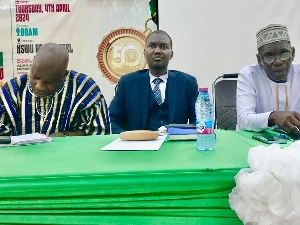 Dr Atik Adam with other guests at the Annual Performance Review
Dr Atik Adam with other guests at the Annual Performance Review
The Chief Executive Officer of the Tamale Teaching Hospital, Dr. Atik Adam, has
appealed to Ghana Water Company Limited and the Electricity Distribution Company for uninterrupted water and electricity supply to the facility.
He said the frequent interruptions in the supply of power and water are critically affecting their service delivery.
The Tamale Metropolis has been hit with an acute water shortage since January, with the water company blaming its inability to regularly supply water to the Northern Region on several factors, including the harsh weather conditions and faulty equipment at the Nawuni Water Intake Plant.
This is coupled with the ongoing interruptions in power supply, locally known as 'dumsor', that have also hit the nation, including Tamale.
Even though the TTH has a dedicated power line, illegal tapping of the lines has
affected the stability of its supply and has in the past few months been hit with severe power outages, despite being a critical infrastructure.
Speaking at the 50th Annual Performance Review of the hospital in Tamale on Thursday, Dr. Atik said the unstable water and power supply are the top challenges affecting its service delivery.
He mentioned the need for the expansion of the hospital’s infrastructure, including the planned construction of a paediatric complex at the facility.
“The challenges facing TTH as we observe fifty years of health service delivery are many and, I dare say, daunting. Topmost on the list are the needs for the expansion of TTH’s infrastructure and equipment base (including the construction of Phase III, i.e., the paediatrics complex), and the need for dedicated, uninterrupted power and water supply to TTH,” he said.
Maternal mortality on the rise at TTH:
The CEO also disclosed that maternal mortality was increasing at the facility.
Dr. Atik said maternal mortality recorded an increase from 719 per 100,000 live births in 2021 to 1,210 per 100,000 live births in 2023.
This means that out of every 100,000 mothers who delivered at the facility in 2021, 719 of them died, while 1,210 of them died in 2023—an increase of 491.
The Northern Regional Minister, Alhaji Shani Alhassan Shaibu, said the government was working with its partners to address the water crisis at the hospital.
He underscored the need for reliable water supply in health service delivery, noting that the government was deeply concerned about the situation.
Alhaji Alhassan Shaibu said all efforts were being made to ensure the situation was addressed.